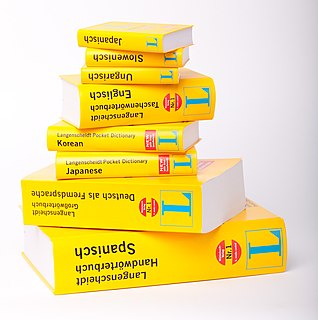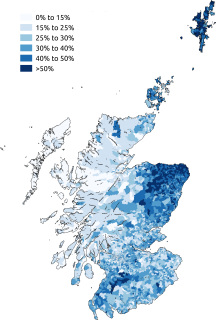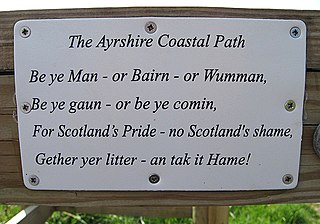
A dictionary is a listing of lexemes from the lexicon of one or more specific languages, often arranged alphabetically, which may include information on definitions, usage, etymologies, pronunciations, translation, etc. It is a lexicographical reference that shows inter-relationships among the data.

The Oxford English Dictionary (OED) is the principal historical dictionary of the English language, published by Oxford University Press (OUP). It traces the historical development of the English language, providing a comprehensive resource to scholars and academic researchers, as well as describing usage in its many variations throughout the world.

Scots is an Anglic language variety in the West Germanic language family, spoken in Scotland and parts of Ulster in the north of Ireland. Most commonly spoken in the Scottish Lowlands, Northern Isles and northern Ulster, it is sometimes called Lowland Scots or Broad Scots to distinguish it from Scottish Gaelic, the Goidelic Celtic language that was historically restricted to most of the Scottish Highlands, the Hebrides and Galloway after the 16th century. Modern Scots is a sister language of Modern English, as the two diverged independently from the same source: Early Middle English (1150–1300).

Sir William Alexander Craigie was a philologist and a lexicographer.
The Macquarie Dictionary is a dictionary of Australian English. It is generally considered by universities and the legal profession to be the authoritative source on Australian English. It also pays considerable attention to New Zealand English. Originally it was a publishing project of Jacaranda Press, a Brisbane educational publisher, for which an editorial committee was formed, largely from the Linguistics department of Macquarie University in Sydney, Australia. It is now published by Macquarie Dictionary Publishers, an imprint of Pan Macmillan Australia Pty Ltd. In October 2007 it moved its editorial office from Macquarie University to the University of Sydney, and later to the Pan Macmillan offices in the Sydney central business district.
Scottish English is the set of varieties of the English language spoken in Scotland. The transregional, standardised variety is called Scottish Standard English or Standard Scottish English (SSE). Scottish Standard English may be defined as "the characteristic speech of the professional class [in Scotland] and the accepted norm in schools". IETF language tag for "Scottish Standard English" is en-scotland.

The history of the Scots language refers to how Anglic varieties spoken in parts of Scotland developed into modern Scots.
Robert William Burchfield CNZM, CBE was a lexicographer, scholar, and writer, who edited the Oxford English Dictionary for thirty years to 1986, and was chief editor from 1971.

The Dictionary of American Regional English (DARE) is a record of American English as spoken in the United States, from its beginnings to the present. It differs from other dictionaries in that it does not document the standard language used throughout the country. Instead, it contains regional and folk speech, those words, phrases, and pronunciations that vary from one part of the country to another, or that we learn from our families and friends rather than from our teachers and books. For DARE, a "region" may be as small as a city or part of a city, or as large as most of the country. Humanities magazine has described it as "a bold synthesis of linguistic atlas and historical dictionary", and William Safire called it "the most exciting new linguistic project in the twentieth century".

Polski Słownik Biograficzny is a Polish-language biographical dictionary, comprising an alphabetically arranged compilation of authoritative biographies of some 25,000 notable Poles and of foreigners who have been active in Poland – famous as well as less-well-known persons – from Popiel, Piast Kołodziej, and Mieszko I, at the dawn of Polish history, to persons who died in the year 2000.

The Oxford Companion to Music is a music reference book in the series of Oxford Companions produced by the Oxford University Press. It was originally conceived and written by Percy Scholes and published in 1938. Since then, it has undergone two distinct rewritings: one by Denis Arnold, in 1983, and the latest edition by Alison Latham in 2002. It is "arguably the most successful book on music ever produced".
The Dictionary of the Scots Language (DSL) is an online Scots-English dictionary, now run by Dictionaries of the Scots Language, formerly known as Scottish Language Dictionaries, a registered SCIO charity. Freely available via the Internet, the work comprises the two major dictionaries of the Scots language:
Adam Jack Aitken was a Scottish lexicographer and leading scholar of the Scots language.

The languages of Scotland are the languages spoken or once spoken in Scotland. Each of the numerous languages spoken in Scotland during its recorded linguistic history falls into either the Germanic or Celtic language families. The classification of the Pictish language was once controversial, but it is now generally considered a Celtic language. Today, the main language spoken in Scotland is English, while Scots and Scottish Gaelic are minority languages. The dialect of English spoken in Scotland is referred to as Scottish English.
The Scottish National Dictionary (SND) was published by the Scottish National Dictionary Association (SNDA) from 1931 to 1976 and documents the Modern (Lowland) Scots language. The original editor, William Grant, was the driving force behind the collection of Scots vocabulary. A wide range of sources were used by the editorial team in order to represent the full spectrum of Scottish vocabulary and cultural life.

The Chronicles and Memorials of Great Britain and Ireland during the Middle Ages, widely known as the Rolls Series, is a major collection of British and Irish historical materials and primary sources published as 99 works in 253 volumes between 1858 and 1911. Almost all the great medieval English chronicles were included: most existing editions, published by scholars of the 17th and 18th centuries, were considered to be unsatisfactory. The scope was also extended to include legendary, folklore and hagiographical materials, and archival records and legal tracts. The series was government-funded, and takes its unofficial name from the fact that its volumes were published "by the authority of Her Majesty's Treasury, under the direction of the Master of the Rolls", who was the official custodian of the records of the Court of Chancery and other courts, and nominal head of the Public Record Office.
A Dictionary of Canadianisms on Historical Principles (DCHP) is a historical usage dictionary of words, expressions, or meanings which are native to Canada or which are distinctively characteristic of Canadian English though not necessarily exclusive to Canada. The first edition was published by W. J. Gage Limited in 1967. The text of this first edition was scanned and released as a free-access online dictionary in 2013.

Modern Scots comprises the varieties of Scots traditionally spoken in Lowland Scotland and parts of Ulster, from 1700.
This is a comparison of English dictionaries, which are dictionaries about the language of English. The dictionaries listed here are categorized into "full-size" dictionaries, "collegiate", and "learner's".

MairiRobinson was best known for her dedication towards the study of the Scottish language and Scottish lexicography. She worked on the later stages of the Scottish National Dictionary and became the editor-in-chief where she oversaw the 1985 publication for the Concise Scots dictionary. She was Scots language consultant for the complete edition of Sir Walter Scott's novels. She was committed to adult learning. Her work has been a noteworthy contribution to the Scots language and to the confidence of the Scottish people about their language.











